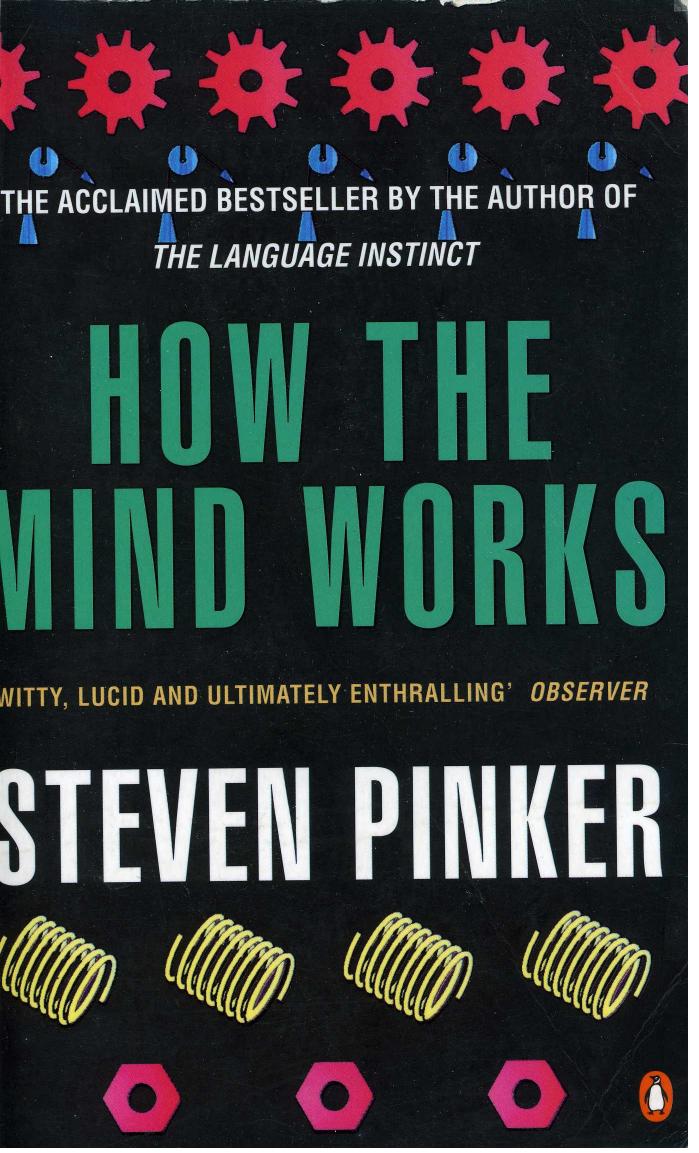How the Mind Works by Steven Pinker

Author:Steven Pinker
Language: eng
Format: mobi, epub, pdf
ISBN: 9780141927879
Publisher: Penguin Books Ltd
Published: 1999-01-28T10:00:00+00:00
Most people choose either the D card or the D card and the 3 card. The correct answer is D and 7. “P implies Q” is false only if P is true and Q is false. The 3 card is irrelevant; the rule said that D’s have 3s, not that 3’s have D’s. The 7 card is crucial; if it had a D on the other side, the rule would be dead. Only about five to ten percent of the people who are given the test select the right cards. Even people who have taken logic courses get it wrong. (Incidentally, it’s not that people interpret “If D then 3” as “If D then 3 and vice versa.” If they did interpret it that way but otherwise behaved like logicians, they would turn over all four cards.) Dire implications were seen. John Q. Public was irrational, unscientific, prone to confirming his prejudices rather than seeking evidence that could falsify them.
But when the arid numbers and letters are replaced with real-world events, sometimes—though only sometimes—people turn into logicians. You are a bouncer in a bar, and are enforcing the rule “If a person is drinking beer, he must be eighteen or older.” You may check what people are drinking or how old they are. Which do you have to check: a beer drinker, a Coke drinker, a twenty-five-year-old, a sixteen-year-old? Most people correctly select the beer drinker and the sixteen-year-old. But mere concreteness is not enough. The rule “If a person eats hot chili peppers, then he drinks cold beer” is no easier to falsify than the D’s and 3’s.
Leda Cosmides discovered that people get the answer right when the rule is a contract, an exchange of benefits. In those circumstances, showing that the rule is false is equivalent to finding cheaters. A contract is an implication of the form “If you take a benefit, you must meet a requirement”; cheaters take the benefit without meeting the requirement. Beer in a bar is a benefit that one earns by proof of maturity, and cheaters are underage drinkers. Beer after chili peppers is mere cause and effect, so Coke drinking (which logically must be checked) doesn’t seem relevant. Cosmides showed that people do the logical thing whenever they construe the P’s and Q’s as benefits and costs, even when the events are exotic, like eating duiker meat and finding ostrich eggshells. It’s not that a logic module is being switched on, but that people are using a different set of rules. These rules, appropriate to detecting cheaters, sometimes coincide with logical rules and sometimes don’t. When the cost and benefit terms are flipped, as in “If a person pays $20, he receives a watch,” people still choose the cheater card (he receives the watch, he doesn’t pay $20)—a choice that is neither logically correct nor the typical error made with meaningless cards. In fact, the very same story can draw out logical or nonlogical choices depending on the reader’s interpretation of who, if anyone, is a cheater.
Download
How the Mind Works by Steven Pinker.epub
How the Mind Works by Steven Pinker.pdf
This site does not store any files on its server. We only index and link to content provided by other sites. Please contact the content providers to delete copyright contents if any and email us, we'll remove relevant links or contents immediately.
The Art of Thinking Clearly by Rolf Dobelli(8836)
Mindhunter: Inside the FBI's Elite Serial Crime Unit by John E. Douglas & Mark Olshaker(7827)
Change Your Questions, Change Your Life by Marilee Adams(6637)
Nudge - Improving Decisions about Health, Wealth, and Happiness by Thaler Sunstein(6629)
Mastermind: How to Think Like Sherlock Holmes by Maria Konnikova(6225)
The Power of Now: A Guide to Spiritual Enlightenment by Eckhart Tolle(4749)
Men In Love by Nancy Friday(4315)
Factfulness: Ten Reasons We're Wrong About the World – and Why Things Are Better Than You Think by Hans Rosling(4015)
The Confidence Code by Katty Kay(3561)
Thinking in Bets by Annie Duke(3527)
Man and His Symbols by Carl Gustav Jung(3309)
Three Women by Lisa Taddeo(2916)
The Worm at the Core by Sheldon Solomon(2910)
Why Buddhism is True by Robert Wright(2820)
Liar's Poker by Michael Lewis(2805)
The Inner Life of Animals by Peter Wohlleben(2763)
Descartes' Error by Antonio Damasio(2728)
The Power of Mindful Learning by Ellen J. Langer(2705)
The Slow Fix: Solve Problems, Work Smarter, and Live Better In a World Addicted to Speed by Carl Honore(2570)
